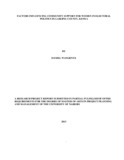| dc.description.abstract | This study analyzed factors influencing community support to women in electoral processes in Laikipia County, Kenya. Specifically, the study examined the electoral positions being contested for by women, socio-cultural factors influencing community support for women, and constraints faced by women in electoral politics. Feminism theory was used to explicate women‟s participation in electoral process, and as such formed the study‟s theoretical frameworks. This was a descriptive study done in Laikipia County. The used a sample size of 384 respondents, which was selected through stratified random sampling. Data was collected largely by use of questionnaires. Data collected was analyzed using descriptive statistics and then reported in frequencies and presented in tables. This study recommends for development of comprehensive urban policy that recognizes the informal sector as a viable source of livelihood. The study found that community support for women in electoral politics was largely influenced by the electoral position being contested, with such support leaning toward women contesting for the position of women representative. Community revealed that they could not support women contesting for the position of governor and president, a decision that was born out of Community‟s inadequate knowledge of the electoral rights of women. Less than 25% of potential women leaders offered themselves for electoral politics, a situation that negatively affected their overall success in the electoral contests. Women‟s marital status, level of education and party affiliation were the major socio-cultural issues that influenced community‟s support for women in electoral politics, with most support going to married women and women with university level of education. High costs of electoral campaigns, electoral violence and lack of democracy and transparency in political parties were some of the outstanding constraints faced by women in electoral politics in Laikipia County. A significant proportion of community conceded that they had very little knowledge of the constitutional rights of women to electoral politics. This study recommends for urgent education of the community about the constitution generally and the provisions on women specifically so that future electoral decisions are from an informed position. In terms of policy, this study recommends for the development of comprehensive political party regulations and financing of electoral campaigns. | en |

